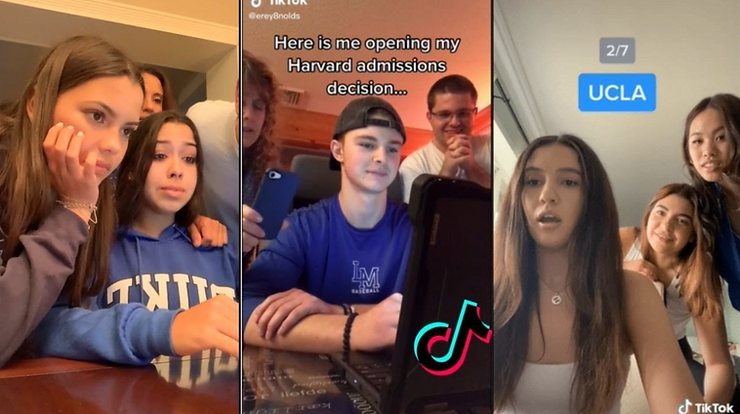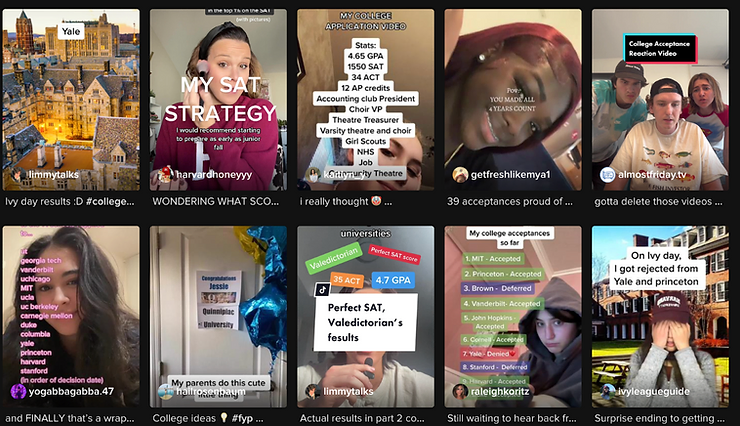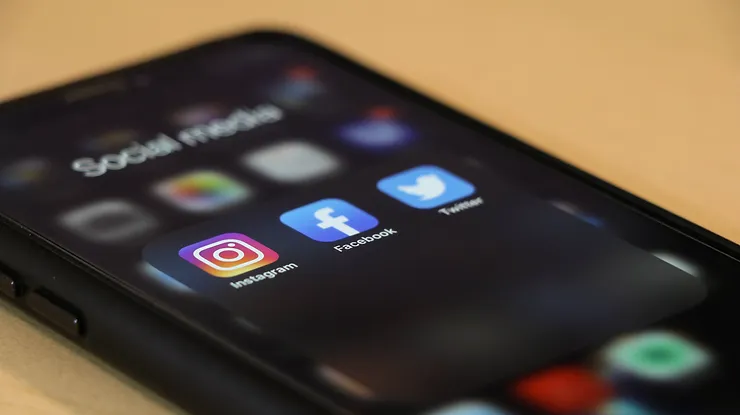Adrianne is a college admissions consultant and TV/film director, producer, writer, and actress currently based in LA. She uses her experience in multiple disciplines to help students achieve their personal and academic goals.
The college admissions process is a stressful time for any student, but with the growing presence of college admissions content on social media, it has become even more daunting. Seeing viral videos of people being accepted into their top-choice schools can leave many young people feeling discouraged if they don’t see the same outcome.

You’ve probably seen these videos — a student in a college sweatshirt surrounded by friends and family is looking eagerly at their laptop. They finally click on their admissions portal and reveal their admissions decision to one or more of the most selective colleges in the country: YES! The people around them break out into cheers and tears as this student’s dream has finally come true.
There’s an obvious reason these videos are so popular. When students are accepted and celebrated, it’s heartwarming and inspiring, and seeing this helps people believe that they too can achieve their goals. But every time you see one of these videos, you’ll probably see comments lamenting their own rejection from their dream school. Take, for instance, a few of the comments on a YouTube compilation of college admissions decisions reactions on TikTok:
“I came here for comfort because my best friend just got accepted to my dream college and I haven’t heard back…”
“I still have one year left of high school, but I’m so scared I’ll get rejected from all the schools I will apply to… I feel like I won’t be good enough.”
“Just got rejected by my first option. Super discouraged now.”
It’s clear that seeing others sharing their experience with the college admissions process can induce a lot of anxiety. In 2014, the American Psychological Association found that the race for acceptance into top colleges is one of high school students’ primary stressors, and, as mental health advocate Zach Gottlieb wrote in The Atlantic, “videos only exacerbate the already over-the-top stress students feel around college admissions.”
So, is this barrage of admission decision content, especially decisions from the most competitive universities, helping or hurting the viewers who will soon be in that position? And as much as we want to celebrate the successes of young people, is it hurting the even younger generations if we continue to share this content?

YouTube compilation of college acceptance TikToks
The trend of going viral while announcing one’s college acceptances (or rejections, if you’re brave enough to post them) has gained momentum in recent years, with future students from top schools like Harvard and Stanford happily announcing their news via short videos on the popular app. While this method of sharing joyous personal news is not new by any means and college admissions content has long existed on many social media platforms, it seems the college admissions landscape on social media even beyond decision reaction videos has changed drastically just in the past few years.
If you’re a current high school student, there’s no doubt that you’ve seen at least a few #CollegeAdmissions videos on your For You or Explore pages at some point. Even if it didn’t change your perspective on your own academic trajectory, it can still affect how you view yourself in relation to others.
The Different Kinds of College Admissions Social Media Content
If you’re a parent of a current high school student with social media accounts, you may be curious as to what kind of content your child may be coming into contact with online. It’s not just TikTok, although that’s the social media platform with the most engaging algorithm — Instagram, Twitter, YouTube, Reddit, and more have plenty of admissions content.
For example, a quick search through the #CollegeAdmissions TikTok will yield the following:
Student profiles: Students will post where they were accepted/rejected/waitlisted along with their “stats,” i.e. their standardized test scores (which are becoming less relevant thanks to test optional schools), GPA, number and prestige of extracurriculars, hours of community service, and so on. There are thousands of videos analyzing profiles and student achievements like a math problem — for instance, they’ll show you how a student with a 3.7 GPA and 1400 SAT got into UPenn. Some influencers have even created formulas and opened forums for high school students to have their statistics “analyzed” and the outcome of their college admissions process predicted in front of a massive audience.
General College Admissions Advice: These kinds of videos give you insight, either from college admissions consultants like us, current students, and/or influencers, into specific parts of the college admissions process. For example, there are videos titled “3 Things College Admissions Officers Look for in Your Activities List” or “Here’s How I Wrote the Personal Essay That Got Me Into Princeton and Yale.”
School-Specific Advice: Basically like the above but targeted towards a specific school, i.e. “What You Need to Know to Get Into UCLA.” Sometimes this comes straight from students on the campus who use their own personal experiences to offer insight.
Standardized Test Prep: Some standardized test prep tutors and companies offer actual questions in the form of short-form videos, which then offer solutions and explanations to problems. This can be an alternative for low-income students to some of the pricier standardized testing prep books and courses, albeit not as tailored and comprehensive.
And, of course, admissions decision reactions.
These student profiles in particular drive a particular focus on the numbers game that accompanies the college application process. Much like how the number of likes a teenager gets on an Instagram post can affect their self-perception and self-esteem, this obsession with statistics can bring about what the New Yorker‘s Jay Caspian Kang calls, a particular kind of “misery.” In his most recent article, he laments:
“How long can this exclusive and ultimately pointless system hold up? How long can kids exhaust themselves in pursuit of perfect stats? How long until they accept that their fate lies with a group of strangers… What has resulted is a fevered competition in which the participants feel that the stakes are a matter of life and death, and where all the referees — admissions officials, TikTok commenters, and the like — are consistently lying about pretty much everything.”

Results for the #collegeacceptance hashtag on TikTok
The Good, the Bad, and the Ugly
As with most resources out there in the college admissions world, social media can be used as a tool, and it can quickly become a hindrance. It all depends on your perspective.

The Good: Social media can provide students with an unprecedented level of transparency in the college admissions process. Many of the top four-year colleges in the U.S., especially the Ivies, have always had an air of mystery around their exclusive admissions process — until now. This level of access can potentially give them a direct line to college admissions officers, college counselors, influencers, alumni, and current college students to answer their questions about the application timeline, essay topics, and any other queries they may have.
It also allows students to connect with other high schoolers in similar situations and learn more about potential opportunities they might have while applying to college. International students can find out more about what it would be like to study at a school across the world, and low-income students can more easily research scholarship opportunities and financial aid availability.
And students can use social media to their advantage by creating a portfolio of their work and showcasing student projects — see this H&C blog post on how students can use social media as a part of their college application.
The Bad: While there are certainly benefits to using social media for college admissions, it can also be extremely overwhelming for students. With so much information out there, it can be hard to separate fact from fiction and rumors from reality. It can also lead to an unhealthy focus on the numbers game and a fixation on competing with other students.
Furthermore, students may start to feel like they need to conform to others in order to achieve their dreams. If you’d like to read more about the complicated situation of mental health in the college admissions landscape, read this blog post on our website.

The Ugly: The social media landscape, as discussed, also has a dark side, with some students using it as a digital platform to brag about their accomplishments and put down those around them. There is often an unhealthy comparison between different students, which can lead to feelings of inadequacy or even depression. This can be especially damaging for high schoolers already facing the pressures of college admissions.
Perhaps more importantly, as Kang mentioned in his New Yorker article — social media doesn’t require fact-checking, meaning that social media posts could contain outright fabrications of statistics and results. In short: take everything with a grain of salt.
However, there are steps that students and their parents can take to protect themselves from the negative aspects of social media. They should only follow accounts and influencers that provide credible information about the college admissions process and should be critical of what they are reading on social media. Additionally, it is important for students to remember that the admissions process is not a competition, and to focus on their own goals instead of comparing themselves to others.
Final Thoughts
Social media can be an incredibly powerful tool for students in the college admissions process, but it’s important to use it responsibly. Students should make sure to research thoroughly and choose credible sources of information about the college admissions landscape. It’s also important to remember that the admissions process is not a competition, and students should focus on their own goals and aspirations instead of comparing themselves to others on social media.

Looking for help with your Ivy League college applications? Check out our guide here, or set up a free consultation with one of our experienced college admissions counselors.



